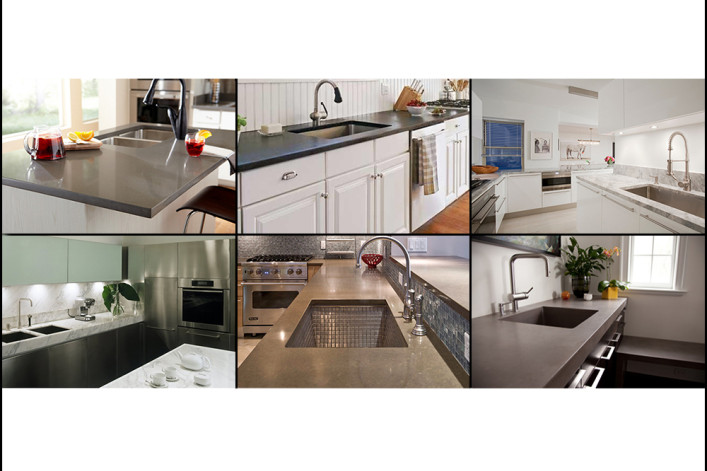NYC Renovation Qs: What's best for kitchen countertops?

Q. I’m redoing my kitchen and trying to figure out the best material for the countertops. I like the look of granite, marble, Caesarstone, Silestone, soapstone and concrete. What are the pros and cons of each based on heat, stains, price and the time it’ll take to finish the project?
A. The countertop is a crucial decision in a kitchen--it's the surface that you interact with the most, it'll get the most use (and abuse) of any surface in the house, and it's the visual touchstone of your kitchen. Here’s a rundown of each option you’re considering.
Prices for these six materials fall within the following ranges:
- Granite: $200/square foot
- Marble/caesarstone/silestone: $175/square foot
- Soapstone: $200/square foot
- Concrete: $300/square foot, starting at a minimum of $10,000 for an average kitchen. The price reflects the labor involved, rather than the materials alone, since its a matter of having crews available to do all the work.

Above: Granite countertops (Photo credit: Houzz)
1. Granite: Granite is extremely durable--which can make it more costly, since it’s difficult to cut, though it has availability in every price range. Depending on what you select, it can be more or less expensive than other options. For example, stone that comes from a quarry in Italy is more expensive than Chinese granite. As a surface, it’s less likely to be damaged by things like tomato sauce and other acidic spills. It can scratch, but not easily. It's more difficult to polish, so re-polishing is more expensive.

Above: Marble countertops (Photo credit: Houzz)
2. Marble: While beautiful and natural, pure marble is softer, so it stains and burns easily, particularly if you put anything acidic on the counter. It also scratches relatively often. It can be less expensive than granite, but it’s far from the cheapest option. If you’re someone who cooks a lot, it's probably not the best bet. Overall, it’s a higher maintenance selection--it must be sealed before use and resealed every 3-6 months. All spills need to be wiped up immediately and cleaned with a neutral detergent.
If you love the look, be prepared to be vigilant. Choose a honed marble (satin smooth surface finish with little or no gloss) with a low absorption rate (less likely to absorb liquids or oils) and keep the paper towels handy.

Above: Caesarstone countertops (Photo credit: Houzz)
3. Caesarstone: This is an engineered stone made of quartz. It’s non-porous, scratch resistant and highly resistant to stains--in other words, it's designed to handle abuse. It has a simplified fabrication and installation process that may make it more cost-effective, but it can cost more than marble because it's synthetic and needs to be manufactured.

Above: Silestone countertops (Photo credit: Houzz)
4. Silestone: This quartz surfacing material is similar to Caesarstone in durability (90% quartz) and price but with the addition of anti-bacterial properties, so it’s frequently used in healthcare as well as kitchens. Silestone and Caesarstone are two sides of the same coin, from the same general family of manufactured material.

Above: Soapstone countertops (Photo credit: Houzz)
5. Soapstone: Soapstone is soft and easily fabricated. Like marble, soapstone requires maintenance--regular oiling and buffing recommended--and is not as heat resistant as granite, though it is resistant to acid etching. It does dent and scratch, though most scratches can be sanded away. Its color darkens with age (which may be a plus, depending on your taste).

Above: Concrete countertops (Photo credit: Houzz)
6. Concrete: While it may be counterintuitive, concrete can be more expensive than granite. On the plus side, there’s a lot of flexibility in how it looks, but it also requires care and maintenance. It’s prone to cracking, so expansion joints may be required to control cracks in larger surfaces. Installation should be done by a professional who has experience with the material. Like marble, it needs to be sealed, but once sealed it can stand up to heat just as well as granite.
Related posts:
NYC Renovation Qs: What should I ask when checking my contractor's references?
10 first-time renovation mistakes even New Yorkers make
Here's why you may be overpaying for your NYC renovation
NYC Renovation Chronicles: A pre-renovation checklist for your contractor
NYC Renovation Chronicles: 5 contractors to avoid
NYC Renovation Chronicles: 7 tips for finding a great contractor
Fraser Patterson is a former general contractor and the founder of Bolster, a NYC-based company that guarantees the price and outcome of home improvement projects with a first-of-its-kind Home Improvement Project Bond. For more information, visit http://www.getbolster.com. To ask a renovation question, click here.























